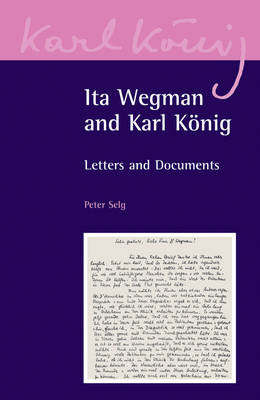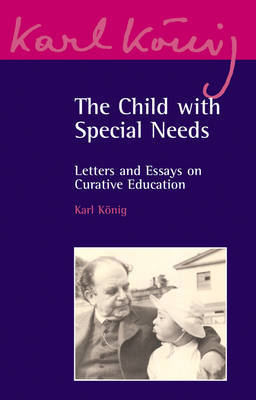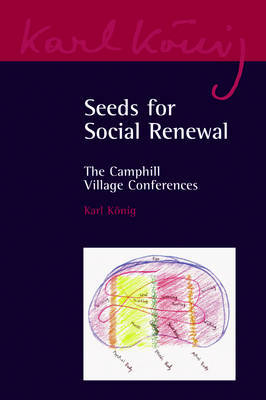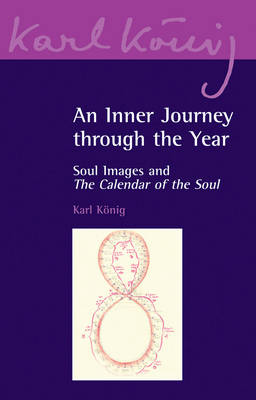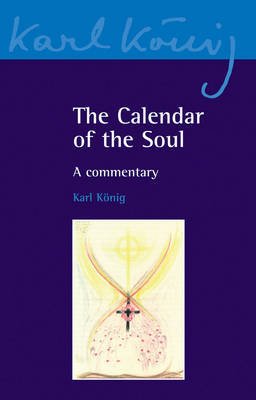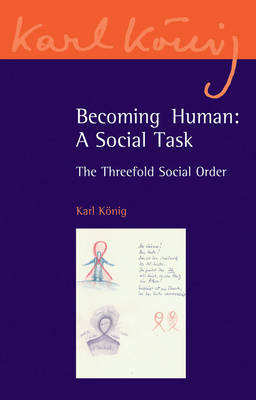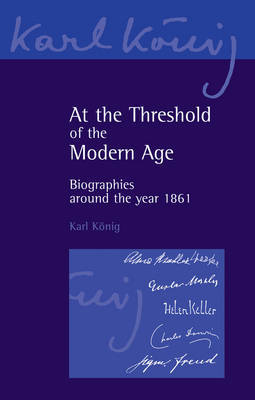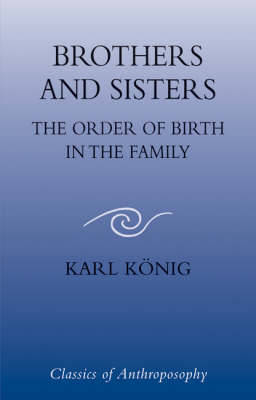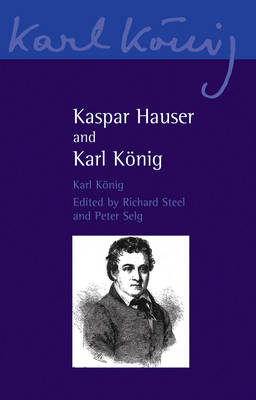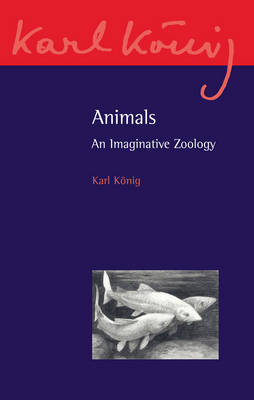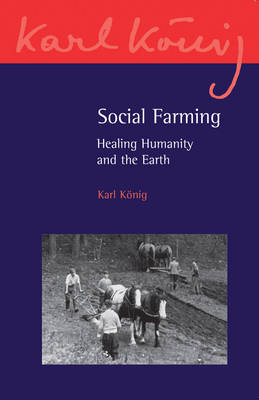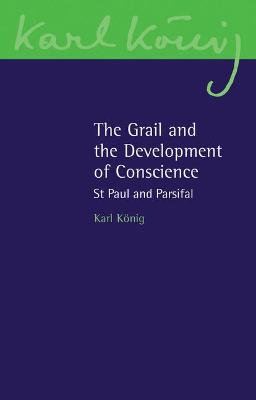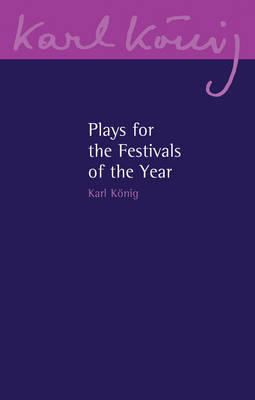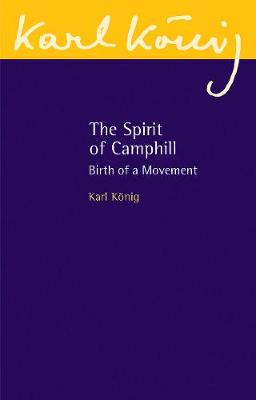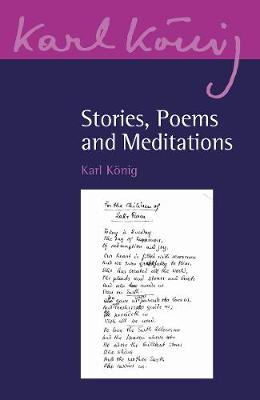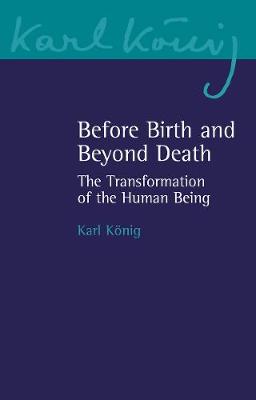Karl Koenig Archive
16 primary works
Book 3
Ita Wegman, born in 1876 to a Dutch family living in Indonesia, first met Rudolf Steiner in Berlin in 1902 when she was 26 years old. She studied medicine at the University of Zurich and in 1917, following Steiner's indications, developed a treatment for cancer using mistletoe. In 1921 she founded the first anthroposophical medical clinic, in Arlesheim, Switzerland, followed in 1922 by the Sonnenhof home for children with special needs.
Karl König first met Wegman in 1927, and she quickly recognized his great potential, as well as his weaknesses. She invited him to work at the Arlesheim clinic as her assistant, and encouraged and advised him in his medical work.
This book includes the complete correspondence between König and Wegman.
Book 4
Karl König, the founder of Camphill, was a prolific lecturer and writer on a wide range of subjects from anthroposophy and Christology through social questions and curative education to science and history. The Karl König Archive are working on a programme of publishing these works over the coming years. This is the fourth book to be published in the series.
In this remarkable collection of Karl König's letters and essays, König considers and discusses the fundamentals of special needs education.
He shows that there are three core aspects to a successful holistic education and healing approach: firstly, a positive social environment, which in the context of Camphill is achieved through small family units of carers and children; secondly, that carers' work is based on an insightful understanding of the nature and potential of each individual child and disability; and thirdly that medical treatment is imbued with courage to keep believing that the impossible is possible.
Book 5
In these lectures König explores the human being and social life, the individual and community, from an imaginative and often radical perspective. These explorations range majestically from masks and archetypal images, the threefold constitution in man and woman, the karma of vocation, and the fundamental social law, to the place of work, religion and culture within the threefold social organism, and karma and reincarnation.
These lectures arose from Karl König's experiences in building up Camphill Communities with extraordinary people with special needs. They are important both for the work in Camphill, as well as more broadly in the field of social therapy and beyond.
This is a revised and expanded edition of the Village Conference Lectures of Karl König, previously published as In Need of Special Understanding.
Book 6
Karl König meditated intensely on the 52 weekly verses of Rudolf Steiner's Calendar of the Soul. During his time in internment on the Isle of Man, he made these 52 naïve, artistic sketches to accompany each verse. This is a wonderful way to experience an important spiritual tool.
There is also a separate book by Karl König, The Calendar of the Soul, which is a complementary text commentary on Steiner's Calendar.
Book 7
Karl König meditated intensely on the 52 weekly verses of Rudolf Steiner's Calendar of the Soul. He often encouraged his colleagues to find inner strength from the verses, and wrote this book as a guide for them, drawing out the patterns through the course of the year.
There are also some lecture notes and additional essays.
This book will be a useful and inspiring guide for anyone who wants to fully understand and experience Steiner's Calendar.
There is also a separate complementary book, An Inner Journey Through the Year, which contains König's 52 colour sketches based on the Calendar of the Soul.
Book 8
Karl Konig, the founder of the Camphill Movement, was very aware of the need for change in the social order he saw around him. In this revealing collection of imaginative thought and ideas, he shows, however, that true social change must begin in individuals.
He goes on to say that renewal is something all human beings can practise themselves, in the midst of their everyday life.
Book 10
The late nineteenth-century was an era of contrasts. On the one hand, philosophical materialism was increasing its influence over science. On the other, there was a growing social awareness and quest for spiritual values.
Karl König explores the personal stories of twenty-nine pioneers whose work and experiences helped shape that era. They include artists and writers, social reformers, philosophers and political activists, and scientists. He considers how they responded as individuals to the challenges of the changing world around them. His insights and conclusions are relevant for us today, as we face our own time of change and upheaval.
The biographies include Helen Keller (18801968), Samuel Hahnemann (17551843), Sigmund Freud (18561939), Lou Salomé (18611937), Gustav Mahler (18601911), Charles Darwin (18091882) and Adolf von Hildebrand (18471921).
Book 11
In this classic work from 1963, Karl König attempts to explain the various characteristics of first-, second- and third-born people, without losing sight of the tremendous individuality of the human being.
Just as our environment shapes our language, social behaviour and mannerisms, so our place in the family also determines how we encounter life.
This book is an invaluable handbook for parents, teachers and carers. Over the years it has become a definitive reference on the subject of child development.
Book 12
Kaspar Hauser was a young man who appeared on the streets of Nuremberg in Germany in the early nineteenth century. His innocence and mysterious background captured the hearts of many at the time.
2012 marks the 200th anniversary of Kaspar Hauser's birth. This timely book draws together Karl König's thoughts on the enigma of Kaspar Hauser, as well as exploring König's deep connection to the young man.
The book includes König's essay 'The Story of Kaspar Hauser', as well as essays from Peter Selg on 'König, Wegman and Kaspar Hauser' and Richard Steel on how König spoke of Kaspar Hauser in his diaries, notes and letters.
Book 13
Karl König, the founder of the Camphill movement, had great compassion and empathy for people on the margins of society. He also felt the same brotherly feelings towards the animal world. This remarkable book offers a closer understanding of some specific mammals, fish and birds and, along the way, great insight into human nature as well.
König considers the mythological and historical background, and unique characteristics, of elephants, bears, horses, cats and dogs; penguins, seals, dolphins, salmon and eels; and swans and stork, sparrows and doves. Together, the lively sketches form a visionary zoology.
First published in English as three separate volumes.
Book 14
'The task is to create a form of social life by which the soil, the plants, the animals are in harmony with each other.' -- Karl König
Karl König was deeply concerned for the relationship between the earth and humanity, and how landscape, plants and animals contribute to that relationship.
This book presents sixteen lectures and essays by König, which explore the connection between biodynamics, domestic animals, elemental beings and many other aspects of farming and agriculture, all the time looking for how harmony and balance can be achieved in relation to the needs of human beings.
This includes a revised edition of material previously published in Earth and Man.
Book 16
König often gave lectures based around Christian festivals, and the selection in this book were first presented at Easter time. The central theme here is the development of conscience and memory, which raises questions about individual freedom and spirituality, particularly in the context of community building.
Running alongside the main theme, König discusses subjects close to his heart including the search for the Grail, Parsifal and St Paul, bringing them together in surprising and challenging ways.
Book 17
Karl König's plays for the festivals of the year are arguably his most original creations. Written to be performed in Camphill communities, they show a deep understanding of the Christian festivals.
With one exception, all fourteen plays were written during the early years of the Camphill movement, and König's hope was that their performance would help bring communities together. Not only is their content entertaining and informative, but the act of performing provides great benefits as social therapy.
Since then, the plays have been translated into many languages and performed in Camphill and other communities around the world.
This is the first time that the original texts of all the plays have been published together. They are presented with an introduction and commentary by series editor Richard Steel, alongside fascinating performance photographs.
Book 18
Fleeing from Nazi Europe in the late 1930s, Austrian-born Karl König and his colleagues founded the first Camphill community, for children with special needs, outside Aberdeen in the north of Scotland. The seven essays by König in this book explain the principles behind what would grow to become a worldwide movement.
The insights in this book reveal the inner motivations that drove König and his team to persevere with their social project, and help modern-day readers to understand how they succeeded in building a network that now numbers over one hundred communities in twenty countries around the world.
Includes extensive diary excerpts, documents and photographs from the Karl König Archive.
Book 19
Alongside his work with the Camphill movement, Karl König was a prolific writer of stories, poems and meditative verses. This book contains:
-- A selection of his creative work
-- Verses for specific occasions
-- Twenty-four poems
-- Four stories for children
-- Ten other short stories, including Also a Christmas Story
An extensive introductory essay explores the cultural environments in which König was writing -- including Vienna in the early twentieth century, and the challenging times leading up to the Second World War -- and discusses the creative development of his literary work.
Book 20
"We could all benefit positively if we direct our thoughts to all of humankind and consider that birth and death are only portals. We must recognise that the greater part of humankind exists beyond these portals and that we are one with them." -- Karl König
Karl König, following Rudolf Steiner's teachings, believed that human beings are eternal and that our time in our earthly bodies is just one part of our journey. Our souls exist before birth and continue on beyond death until they are reborn.
In these important lectures and essays, König argues that the greatest part of our community exists beyond this earthly life. He calls on us not to neglect our connection with them and encourages us to solicit their guidance so that we might rediscover the values that our society has lost.
In this remarkable book, König suggests that by changing our everyday thinking, we can create a bridge across the threshold of death, allowing essential communication between humans in different states of being and uniting humankind to the benefit of all.
